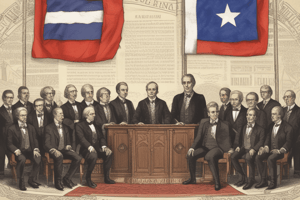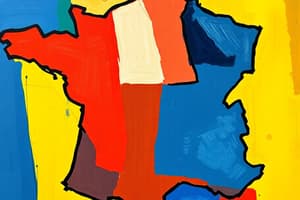Podcast
Questions and Answers
Quel énoncé est vrai concernant la souveraineté dans l'ordre interne ?
Quel énoncé est vrai concernant la souveraineté dans l'ordre interne ?
- L'état n'a pas le pouvoir d'auto-organisation.
- La souveraineté est subordonnée à d'autres pouvoirs.
- L'ordre juridique national n'est pas déterminé par l'état.
- L'état fixe ses propres règles fondamentales. (correct)
Quel est le rôle de la Constitution dans la hiérarchie des normes internes ?
Quel est le rôle de la Constitution dans la hiérarchie des normes internes ?
- Elle est placée au sommet de la hiérarchie des normes. (correct)
- Elle est soumise aux lois ordinaires.
- Elle ne détermine pas la structure de pouvoir.
- Elle peut être modifiée par les instances internationales.
Qu'est-ce qu'implique l'état créateur de droit ?
Qu'est-ce qu'implique l'état créateur de droit ?
- L'état est soumis au contrôle de constitutionnalité des lois. (correct)
- L'état est au-dessus des lois qu'il crée.
- L'état ne peut être contrôlé par le juge administratif.
- L'état ne respecte pas les droits des citoyens.
Quel type de transfert de souveraineté peut être consenti par les états ?
Quel type de transfert de souveraineté peut être consenti par les états ?
Qu'implique la souveraineté de l'état par rapport à son ordre juridique ?
Qu'implique la souveraineté de l'état par rapport à son ordre juridique ?
Quel est le rôle principal d'une constitution dans un régime politique ?
Quel est le rôle principal d'une constitution dans un régime politique ?
Quelle fonction de la constitution est considérée comme un acte fondateur ?
Quelle fonction de la constitution est considérée comme un acte fondateur ?
Depuis quel événement en France chaque changement de régime politique a-t-il été traduit par un changement de constitution ?
Depuis quel événement en France chaque changement de régime politique a-t-il été traduit par un changement de constitution ?
Quels éléments sont inclus dans les principes fondamentaux assignés au régime ?
Quels éléments sont inclus dans les principes fondamentaux assignés au régime ?
Quelle caractéristique est liée à la nature d'un régime politique selon la constitution ?
Quelle caractéristique est liée à la nature d'un régime politique selon la constitution ?
Quel organe de l'État n'est PAS mentionné comme étant établi par la constitution ?
Quel organe de l'État n'est PAS mentionné comme étant établi par la constitution ?
Quels types de régimes peuvent être établis par la constitution ?
Quels types de régimes peuvent être établis par la constitution ?
Quelle est l'une des fonctions de la constitution en tant qu'acte de garantie ?
Quelle est l'une des fonctions de la constitution en tant qu'acte de garantie ?
Quel est l'objectif principal de la Constitution en matière de pouvoir ?
Quel est l'objectif principal de la Constitution en matière de pouvoir ?
Comment la Constitution contribue-t-elle à l'État de droit ?
Comment la Constitution contribue-t-elle à l'État de droit ?
Quelles sont les conditions pour que la démocratie soit réalisée selon la Constitution ?
Quelles sont les conditions pour que la démocratie soit réalisée selon la Constitution ?
Quel document stipule les droits et libertés fondamentales des citoyens en France ?
Quel document stipule les droits et libertés fondamentales des citoyens en France ?
Quelle est l'une des fonctions du Conseil constitutionnel en France ?
Quelle est l'une des fonctions du Conseil constitutionnel en France ?
Quel principe est transformé par la Constitution pour limiter les mandats présidentiels en France ?
Quel principe est transformé par la Constitution pour limiter les mandats présidentiels en France ?
Quel rôle joue le pouvoir constituant originaire selon la Constitution ?
Quel rôle joue le pouvoir constituant originaire selon la Constitution ?
Comment la Constitution garantit-elle l'effectivité de l'État de droit ?
Comment la Constitution garantit-elle l'effectivité de l'État de droit ?
Quel est le lien entre la loi et la constitution selon la théorie Kelsenienne ?
Quel est le lien entre la loi et la constitution selon la théorie Kelsenienne ?
Qu'est-ce que le légicentrisme dans le contexte du droit français ?
Qu'est-ce que le légicentrisme dans le contexte du droit français ?
Quel impact la Constitution de 1958 a-t-elle sur la souveraineté du parlement ?
Quel impact la Constitution de 1958 a-t-elle sur la souveraineté du parlement ?
Quelle a été une conséquence du légicentrisme sur la notion de contrôle constitutionnel ?
Quelle a été une conséquence du légicentrisme sur la notion de contrôle constitutionnel ?
Comment est définie la loi selon la tradition du légicentrisme ?
Comment est définie la loi selon la tradition du légicentrisme ?
Quel est le rôle des états fédérés dans le cadre du contrôle des lois par la fédération ?
Quel est le rôle des états fédérés dans le cadre du contrôle des lois par la fédération ?
Quelle caractéristique décrit le mieux la souveraineté ?
Quelle caractéristique décrit le mieux la souveraineté ?
Comment peut-on définir l'état unitaire selon le contenu présenté ?
Comment peut-on définir l'état unitaire selon le contenu présenté ?
Quelle est l'origine de la conceptualisation de la souveraineté ?
Quelle est l'origine de la conceptualisation de la souveraineté ?
Quels sont les deux ordres qui définissent la souveraineté d'un état ?
Quels sont les deux ordres qui définissent la souveraineté d'un état ?
Comment la souveraineté est-elle perçue en relation avec l'état ?
Comment la souveraineté est-elle perçue en relation avec l'état ?
Quel exemple montre une exception à l'uniformité dans un état unitaire ?
Quel exemple montre une exception à l'uniformité dans un état unitaire ?
Quelles entités sont reconnues comme titulaires de la souveraineté, en plus de l'état ?
Quelles entités sont reconnues comme titulaires de la souveraineté, en plus de l'état ?
Quelles compétences sont considérées comme régaliennes pour l'État?
Quelles compétences sont considérées comme régaliennes pour l'État?
Comment peut-on définir la souveraineté nationale selon le texte?
Comment peut-on définir la souveraineté nationale selon le texte?
Quel événement a entraîné le renoncement à la politique monétaire par le peuple français?
Quel événement a entraîné le renoncement à la politique monétaire par le peuple français?
Quel principe est mis en avant pour la souveraineté populaire?
Quel principe est mis en avant pour la souveraineté populaire?
En quoi consiste la charte de l'environnement introduite en 2005?
En quoi consiste la charte de l'environnement introduite en 2005?
Qu'est-ce qui caractérise la souveraineté au sein d'un État fédéral?
Qu'est-ce qui caractérise la souveraineté au sein d'un État fédéral?
Quel est l'impact du transfert de compétences aux institutions de l'UE?
Quel est l'impact du transfert de compétences aux institutions de l'UE?
Qui détient le pouvoir législatif en Nouvelle-Calédonie?
Qui détient le pouvoir législatif en Nouvelle-Calédonie?
Flashcards
Régime politique
Régime politique
All legal and factual elements that explain the mode of organization and functioning of political power in a specific society, including the legal structure of powers determined by the constitution.
Droit constitutionnel
Droit constitutionnel
Legal rules that govern the organization and functioning of public powers; sets the rules for political competition and debate, and defines the powers of various political authorities. Also determines the foundations of society and the principles that should govern it.
Constitution
Constitution
A multi-faceted concept; a founding agreement where a community establishes the conditions for exercising political power.
Constitution - Act Founder
Constitution - Act Founder
Signup and view all the flashcards
Functions: Act of Guarantee
Functions: Act of Guarantee
Signup and view all the flashcards
Constitution - Nature of Regime
Constitution - Nature of Regime
Signup and view all the flashcards
Constitution - Fundamental Principles
Constitution - Fundamental Principles
Signup and view all the flashcards
Functions of the Constitution - Establishing Power Organisation
Functions of the Constitution - Establishing Power Organisation
Signup and view all the flashcards
State Sovereignty
State Sovereignty
Signup and view all the flashcards
Internal Sovereignty
Internal Sovereignty
Signup and view all the flashcards
State's Self-Organization
State's Self-Organization
Signup and view all the flashcards
Constitutional Hierarchy
Constitutional Hierarchy
Signup and view all the flashcards
Limited Sovereignty
Limited Sovereignty
Signup and view all the flashcards
Constitution's Role
Constitution's Role
Signup and view all the flashcards
Separation of Powers
Separation of Powers
Signup and view all the flashcards
State of Law
State of Law
Signup and view all the flashcards
Popular Sovereignty
Popular Sovereignty
Signup and view all the flashcards
Citizen Participation
Citizen Participation
Signup and view all the flashcards
Fundamental Rights
Fundamental Rights
Signup and view all the flashcards
Constitutional Control
Constitutional Control
Signup and view all the flashcards
Limited Government
Limited Government
Signup and view all the flashcards
Legal Hierarchy Control
Legal Hierarchy Control
Signup and view all the flashcards
Legicentrism
Legicentrism
Signup and view all the flashcards
Kelsen's Theory
Kelsen's Theory
Signup and view all the flashcards
Constitutional Control of Laws
Constitutional Control of Laws
Signup and view all the flashcards
1958 Constitution Impact
1958 Constitution Impact
Signup and view all the flashcards
Federal State Institutions
Federal State Institutions
Signup and view all the flashcards
Federalism
Federalism
Signup and view all the flashcards
Sovereignty
Sovereignty
Signup and view all the flashcards
Sovereignty's origins
Sovereignty's origins
Signup and view all the flashcards
Sovereignty - Internal Dimension
Sovereignty - Internal Dimension
Signup and view all the flashcards
Sovereignty - External Dimension
Sovereignty - External Dimension
Signup and view all the flashcards
Sovereignty's attributes
Sovereignty's attributes
Signup and view all the flashcards
Unitary State Variations
Unitary State Variations
Signup and view all the flashcards
Sovereignty
Sovereignty
Signup and view all the flashcards
State Sovereignty
State Sovereignty
Signup and view all the flashcards
National Sovereignty
National Sovereignty
Signup and view all the flashcards
Shared Sovereignty
Shared Sovereignty
Signup and view all the flashcards
Competence of the State
Competence of the State
Signup and view all the flashcards
Transfer of competencies
Transfer of competencies
Signup and view all the flashcards
National vs. Popular Sovereignty
National vs. Popular Sovereignty
Signup and view all the flashcards
Regalian powers
Regalian powers
Signup and view all the flashcards
Study Notes
Droit Constitutionnel et Institutions Politiques
- Régime politique: All the elements of law and fact that enable the rendering of an account of the organization and functioning of political power in a given society. This includes the structure of power as defined by the constitution.
- Droit constitutionnel: The rules governing the organization and functioning of public powers. It establishes rules of the game for political competition and debate. It also establishes the foundations of society and the principles that govern it.
- Constitution: A multifaceted concept representing an agreement that establishes the conditions for exercising political power within a community.
Première Partie: Constitution, Constitution
- Constitution: A multifaceted concept signifying an agreement that establishes the conditions under which a community exercises its political power.
Titre 1: L'existence d'une constitution
Chapitre 1: Les fonctions de la constitution
I. La constitution, acte fondateur
- Acte fondateur de l'État: An act confirming the establishment of a new state on the international stage.
- Traitant l'affirmation d'un nouvel état: The constitution represents the assertion of a new state on the international stage.
- Acte fondateur d'un régime: Also signifying the foundation of a political regime, especially evident in changes of regime, such as in France since 1791.
- Changements de régime: Every change in the political regime is marked by a change to the constitution.
- Éléments de la constitution:
- Nature du régime (republic, monarchy, empire)
- Forme de l'état (federal, unitary)
- Type d'organisation (decentralized)
- Identité de l'état et du régime (language, emblem, national anthem, motto)
- Principes fondamentaux (e.g., "the government of the people, by the people, for the people", "equal rights for all citizens before the law")
Studying That Suits You
Use AI to generate personalized quizzes and flashcards to suit your learning preferences.




